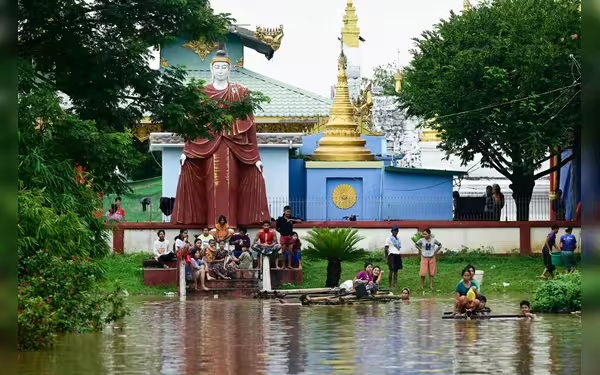Saturday, September 28, 2024 08:20 PM
Myanmar Junta Appeals for Foreign Aid Amid Deadly Floods
- Myanmar junta requests international aid for flood victims.
- Over 235,000 displaced due to catastrophic floods.
- Typhoon Yagi exacerbates ongoing humanitarian crisis.
 Image Credits: arabnewspk
Image Credits: arabnewspkMyanmar junta seeks foreign aid as deadly floods displace thousands, worsening the humanitarian crisis amid ongoing conflict.
Myanmar is currently facing a severe humanitarian crisis as deadly floods wreak havoc across the country. The military junta, which has been in power since 2021, has made a rare appeal for foreign aid to assist the hundreds of thousands of people displaced by these catastrophic floods. This situation comes on the heels of three years of ongoing conflict, making the plight of the affected individuals even more dire.
In the wake of Typhoon Yagi, which struck the region last weekend, floods and landslides have claimed nearly 300 lives across Myanmar, Vietnam, Laos, and Thailand. In Myanmar alone, over 235,000 people have been forced from their homes, according to the junta's reports. The floods have compounded the suffering in a nation already grappling with the consequences of war.
In Taungoo, a city located about an hour south of the capital Naypyidaw, residents are struggling to navigate the floodwaters. Makeshift rafts have become a common sight, as locals attempt to salvage what they can. One farmer, Naung Tun, shared his heartbreaking experience, stating, "I lost my rice, chickens, and ducks. I don’t care about the other belongings. Nothing else is more important than the lives of people and animals." His words reflect the deep emotional toll that these floods have taken on the community.
The intense rainfall following Typhoon Yagi has forced people across Southeast Asia to flee their homes, often using unconventional means such as elephants in Myanmar and jet skis in Thailand. In a statement, junta chief Min Aung Hlaing emphasized the urgent need for international assistance, saying, "Officials from the government need to contact foreign countries to receive rescue and relief aid to be provided to the victims." This marks a significant shift, as the military has historically blocked humanitarian aid from reaching those in need.
Last year, the junta suspended travel authorizations for aid groups attempting to assist around a million victims of Cyclone Mocha, which devastated the western part of the country. The United Nations condemned this decision as "unfathomable," highlighting the ongoing challenges faced by humanitarian organizations in Myanmar.
As the situation unfolds, the military has reported a death toll of 33, while local authorities have indicated that rescuers have recovered 36 bodies. There are concerns that many more may be trapped under landslides, particularly in the central Mandalay region. Military trucks have been deployed to deliver small rescue boats to the hardest-hit areas, but the scale of the disaster is overwhelming.
Naung Tun expressed the struggles faced by many, stating, "Yesterday we had only one meal. It is terrible to experience flooding because we cannot live our lives well when it happens." His sentiment resonates with countless others who are living day-to-day, trying to make ends meet amidst the chaos.
As of now, more than 2.7 million people in Myanmar have already been displaced due to the ongoing conflict triggered by the junta's coup. The situation is equally grim in neighboring countries, with Vietnam reporting 262 deaths and 83 individuals still missing due to the floods. In Laos, images from the capital Vientiane depict homes and buildings submerged by the Mekong River.
This crisis serves as a stark reminder of the fragility of life in regions affected by both natural disasters and political turmoil. The international community must respond swiftly to provide the necessary aid and support to those in need. As the people of Myanmar and their neighbors grapple with the aftermath of these floods, it is crucial to remember that behind the statistics are real lives, families, and communities striving to rebuild amidst adversity.













